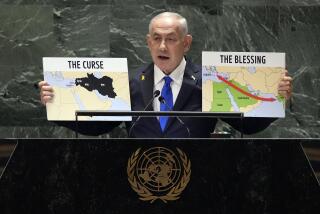Cuba’s Castro lashes out at superpowers in first UN address
- Share via
UNITED NATIONS _ Cuban leader Raul Castro used his first speech before the United Nations General Assembly to lash out at the international body, saying Monday that member states have failed to produce much beyond an “illusion” of the human rights, justice and development promised in the charter.tmpplchld Castro made scant mention of last summer’s landmark restoration of ties with the United States after a five-decade break, instead delivering a searing indictment of world superpowers for allowing millions to remain hungry, illiterate and at risk of death by curable illnesses while annual military expenses worldwide amount to more than $1.7 trillion.tmpplchld “Barely a fraction of that figure could resolve the most pressing problems afflicting humanity,” Castro said.tmpplchld Castro received warm applause and scattered cheers when he made his U.N. debut, and several Latin American and African leaders gave him a standing ovation at the end of his remarks, in apparent approval of his narrative that Western colonialism and imperialism are at the roots of today’s conflicts. He didn’t name names, but his allusions to the United States and its allies were clear as he criticized invasions and overthrows, the “selective and discriminatory” approach to human rights, and the threat of climate change stemming from “an irrational and unsustainable consumerism.”tmpplchld “There have constantly been wars of aggression and interference in the internal affairs of the states, the ousting of sovereign governments by force, the so-called ‘soft coups’ and the recolonization of territories,” Castro said.tmpplchld Predictably, Castro spent time lavishing praise upon Latin American leaders who share the leftist, populist philosophy of the late Venezuelan President Hugo Chavez, but he also ventured further afield, tackling the Middle East and Iran.tmpplchld He endorsed the Iran nuclear deal as proof “that engagement and negotiations are the only effective tools to settle disputes” among nations. He said resolution of the Israeli-Palestinian conflict requires Palestinians’ “inalienable right” to build a state within pre-1967 borders. And he ripped into stakeholders of the bloody Syrian conflict, demanding that the European Union “take full and immediate responsibility for the human crisis it helped to generate” by giving safe haven to refugees.tmpplchld “Syrian people are capable of resolving their disputes by themselves, and we demand the end of external influence in that country,” he said.tmpplchld Well into his half-hour or so of remarks, Castro got around to the Washington-Havana detente, spelling out his regime’s usual conditions for full normalization: removal of the embargo, the return of Guantanamo Bay, an end to “destabilizing” broadcasts to the island, and settlement of claims seeking compensation from the effects of the embargo.tmpplchld He’d made the same argument on Saturday at a U.N. development summit where he called the embargo the “main obstacle” to Cuba’s development and noted that it was “rejected by 188 U.N. member states.”tmpplchld tmpplchld Speaking before Castro, President Barack Obama won applause when he told the assembly he was confident that “our Congress will inevitably lift an embargo that should not be in place anymore.” Obama acknowledged that thorny topics remain _ he specifically mentioned human rights _ but he said progress would happen through “diplomatic relations, and increased commerce, and people-to-people ties.”tmpplchld “Change won’t come overnight to Cuba,” Obama said, “but I’m confident that openness, not coercion, will support the reforms and better the life the Cuban people deserve, just as I believe that Cuba will find its success if it pursues cooperation with other nations.”tmpplchld Obama and Castro are scheduled to meet Tuesday on the sidelines of the U.N. conference, only their second face-to-face meeting. They first met in April during the Summit of the Americas in Panama, and spoke by telephone ahead of the pope’s visit this month.tmpplchld tmpplchld Castro is a busy man at the United Nations; it’s the first General Assembly since the United States and Cuba restored diplomatic relations in July after a break of more than 54 years. He arrived in time to see Pope Francis speak before the assembly Friday and over the weekend attended the development summit, met with former President Bill Clinton and participated in a women’s empowerment conference, where he decried high poverty and illiteracy rates for women worldwide.tmpplchld Throughout his trip, Castro will be meeting with a slew of foreign leaders, dignitaries and members of the Cuban diaspora. In a media call before the assembly, top Obama aide Ben Rhodes, one of the negotiators in the secret talks that culminated in the diplomatic breakthrough, called Castro’s presence in New York “a symbol we’re in a new era.”tmpplchld Although he’s overshadowed by headline-making personalities such as Russia’s Vladimir Putin, Iran’s Hassan Rouhani or Israel’s Benjamin Netanyahu, Castro’s first appearance at the U.N. was welcomed by other world leaders, several of whom praised the thaw between Washington and Havana in their speeches.tmpplchld Portuguese President Anibal Antonio Cavaco Silva said his country welcomed the normalization of diplomatic relations, and Chilean President Michelle Bachelet called the rapprochement “a historic step for our region and the world.” Mexican President Enrique Pena Nieto called for the end of the embargo in recognition of a “new geopolitical reality.” Brazilian President Dilma Rousseff also argued that jettisoning the embargo would complete the process of “putting an end to a dispute derived from the Cold War.”tmpplchld ___tmpplchld (Mimi Whitefield of the Miami Herald contributed to this report.)tmpplchld tmpplchld ___tmpplchld (c)2015 McClatchy Washington Bureautmpplchld Visit the McClatchy Washington Bureau at www.mcclatchydc.comtmpplchld Distributed by Tribune Content Agency, LLC.tmpplchld
More to Read
Sign up for Essential California
The most important California stories and recommendations in your inbox every morning.
You may occasionally receive promotional content from the Los Angeles Times.













